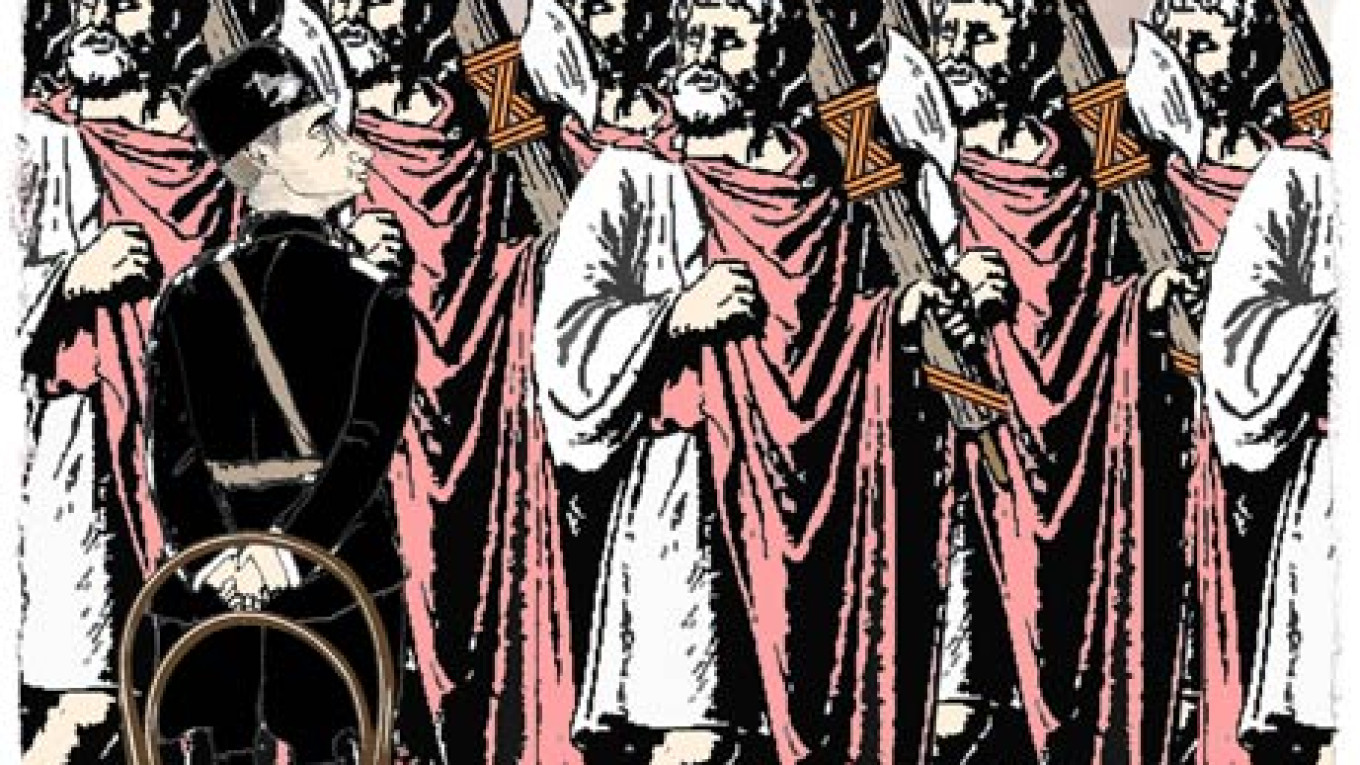President Vladimir Putin's high popularity ratings could prompt the Kremlin to clamp down further on the political system, shifting from a semi-?authoritarian regime dominated by a single party? — United Russia? — to a neo-?corporatist state armed with the latest information technology.
United Russia remains an important policy tool of the Kremlin and continues to serve as a training ground for future senior officials. But the All-?Russia People's Front has taken precedence and harbors far greater ambitions, hoping to rally the entire Russian people directly under Putin's powerful leadership — and relying on elements of corporatism as its guiding principle.
Corporatism, a top-down political model for state control, originated in Europe in the 1920s and 1930s. It is coming back under Putin.
Corporatism, a top-down political model for state control, originated in Europe in the 1920s and 1930s as an attempt to find a "third path" between liberalism and communism. Corporatism rejects the liberal concepts of individual freedom and free political competition as well as the Marxist concept of a class struggle between exploiters and exploited.
Corporatism is ostensibly "democratic" in that it calls for solidarity among the haves and have-nots. In practice, corporatism has paved the way for dozens of dictatorships in Europe and elsewhere over the past century by giving dictators a convenient ideological platform for pronouncing themselves the champion of the people's interests, regardless of party and class.
The manifesto that the All-Russia People's Front adopted last year carries a strong theme of solidarity and corporatism. It can hardly be a coincidence that the short text includes three references to solidarity and calls on the Russian people to form a "cohesive society and a united people." At the same time, it does not use the words "constitution," "freedom," "human rights" or "rights of the minority." On the contrary, it states directly that the majority will dominate.
The All-Russia People's Front purports to unite all citizens in a single "platform for decision-?making" in direct communication with Putin as the national leader. The front has already announced its intention to monitor government procurement contracts, fight corruption and monitor presidential decrees mandating higher salaries, regulating utilities fees and so on. This is partly an attempt to assume some of the control functions that a long defunct parliament has failed to carry out. The front's slogan is also very corporatist: "We are for Russia!"
The membership of the All-Russia People's Front reflects this corporatist logic. It includes several loyal parties in addition to United Russia, the main trade unions, business associations and major figures of culture and art. It is an eclectic mix of university rectors and heads of associations of potato growers, farmers, builders, doctors, teachers, the disabled, Chernobyl victims, university students, Afghanistan War veterans and workers. It is a revamping of Soviet corporatism — one that is fitted with oligarchs and modern media technology.
Elements of corporatism are also evident in the Kremlin-loyal Public Chamber that is charged with co-opting? — or, more precisely, imitating? — elements of civil society.
If leaders do make a serious shift toward forming a neo-corporatist regime, not only will independent nongovernmental organizations likely face increasingly brutal repression by the authorities, but the same surely fate awaits politicians, political parties, writers, artists and businesspeople refusing to become part of the official, vertically organized "corporations."
Vladimir Ryzhkov, a State Duma deputy from 1993 to 2007, is a political analyst.
A Message from The Moscow Times:
Dear readers,
We are facing unprecedented challenges. Russia's Prosecutor General's Office has designated The Moscow Times as an "undesirable" organization, criminalizing our work and putting our staff at risk of prosecution. This follows our earlier unjust labeling as a "foreign agent."
These actions are direct attempts to silence independent journalism in Russia. The authorities claim our work "discredits the decisions of the Russian leadership." We see things differently: we strive to provide accurate, unbiased reporting on Russia.
We, the journalists of The Moscow Times, refuse to be silenced. But to continue our work, we need your help.
Your support, no matter how small, makes a world of difference. If you can, please support us monthly starting from just $2. It's quick to set up, and every contribution makes a significant impact.
By supporting The Moscow Times, you're defending open, independent journalism in the face of repression. Thank you for standing with us.
Remind me later.


